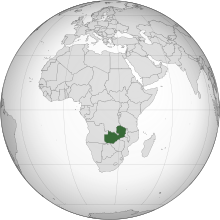
Back معاملة المثليين في زامبيا Arabic Drets del col·lectiu LGBT a Zàmbia Catalan LGBT práva v Zambii Czech Homosexualität in Sambia German Diversidad sexual en Zambia Spanish Droits LGBT en Zambie French Hakkin LGBT a Zambia Hausa זכויות להט"ב בזמביה HE Права ЛГБТ в Замбии Russian Wanangwa wa LGBT mu Zambia TUM
LGBT rights in Zambia | |
|---|---|
 | |
| Status | Illegal since 1911 (as Rhodesia)[1][2] |
| Penalty | Imprisonment: 15 years − possible life sentence[3] |
| Gender identity | No |
| Military | No |
| Discrimination protections | None |
| Family rights | |
| Recognition of relationships | No recognition of same-sex unions |
| Adoption | No |
Lesbian, gay, bisexual, and transgender (LGBT) people in Zambia face significant challenges not experienced by non-LGBT residents.[4] Same-sex sexual activity is illegal for both men and women in Zambia.[1] Formerly a colony of the British Empire, Zambia inherited the laws and legal system of its colonial occupiers upon independence in 1964. Laws concerning homosexuality have largely remained unchanged since then, and homosexuality is covered by sodomy laws that also proscribe bestiality.[1] Social attitudes toward LGBT people are mostly negative and coloured by perceptions that homosexuality is immoral and a form of insanity.[1] However, in recent years, younger generations are beginning to show positive and open minded attitudes towards their LGBT peers.
LGBT persons are subjected to human rights violations by police and authorities. Subject to arbitrary arrest and detentions, they suffer violence and abuse in custody. Police are reported to threaten and extort LGBT persons. Those prosecuted for same-sex conduct are subjected to the use of forced anal examinations for evidence-gathering purposes. Such procedures are invasive and traumatic and are widely condemned by medical authorities and human rights groups; they are discredited for the purpose of providing any evidence of same-sex sexual activity.
Other serious societal discrimination and abuse is directed towards LGBT persons. They may be targeted threats, stalking, vandalism, violence, and other hate crimes, including murders. LGBT people routinely face community harassment and discrimination, with little recourse to assistance from police or government.
In recent years, the onset of the internet has led to more positive support and opinions towards the LGBT community. The fast digitization of the country has led to exposure to more people and stories from different facets of life. This in turn has led to more open minded attitudes amongst the growing youth reducing discrimination and prejudice among people of different communities.
- ^ a b c d Numwa, Regina. "Zambia". Behind The Mask. Archived from the original on 4 June 2008. Retrieved 1 June 2008.
- ^ "Where is it illegal to be gay?". BBC News. 10 February 2014.
- ^ Cite error: The named reference
ILGA 2020was invoked but never defined (see the help page). - ^ "Zambia". Human Dignity Trust. Retrieved 25 August 2023.
© MMXXIII Rich X Search. We shall prevail. All rights reserved. Rich X Search